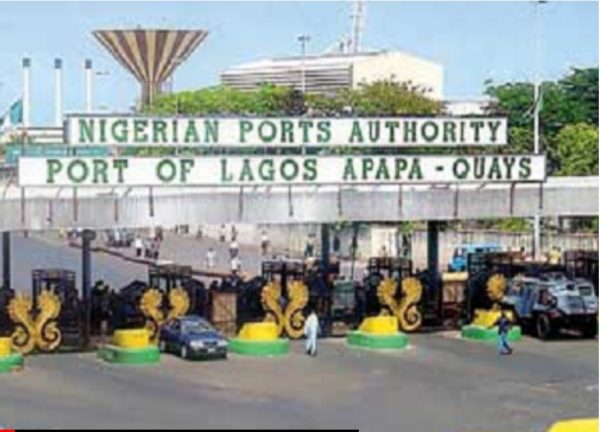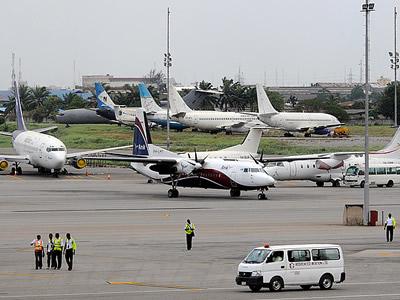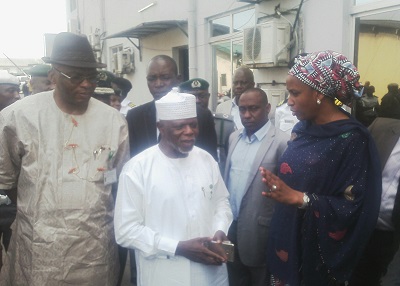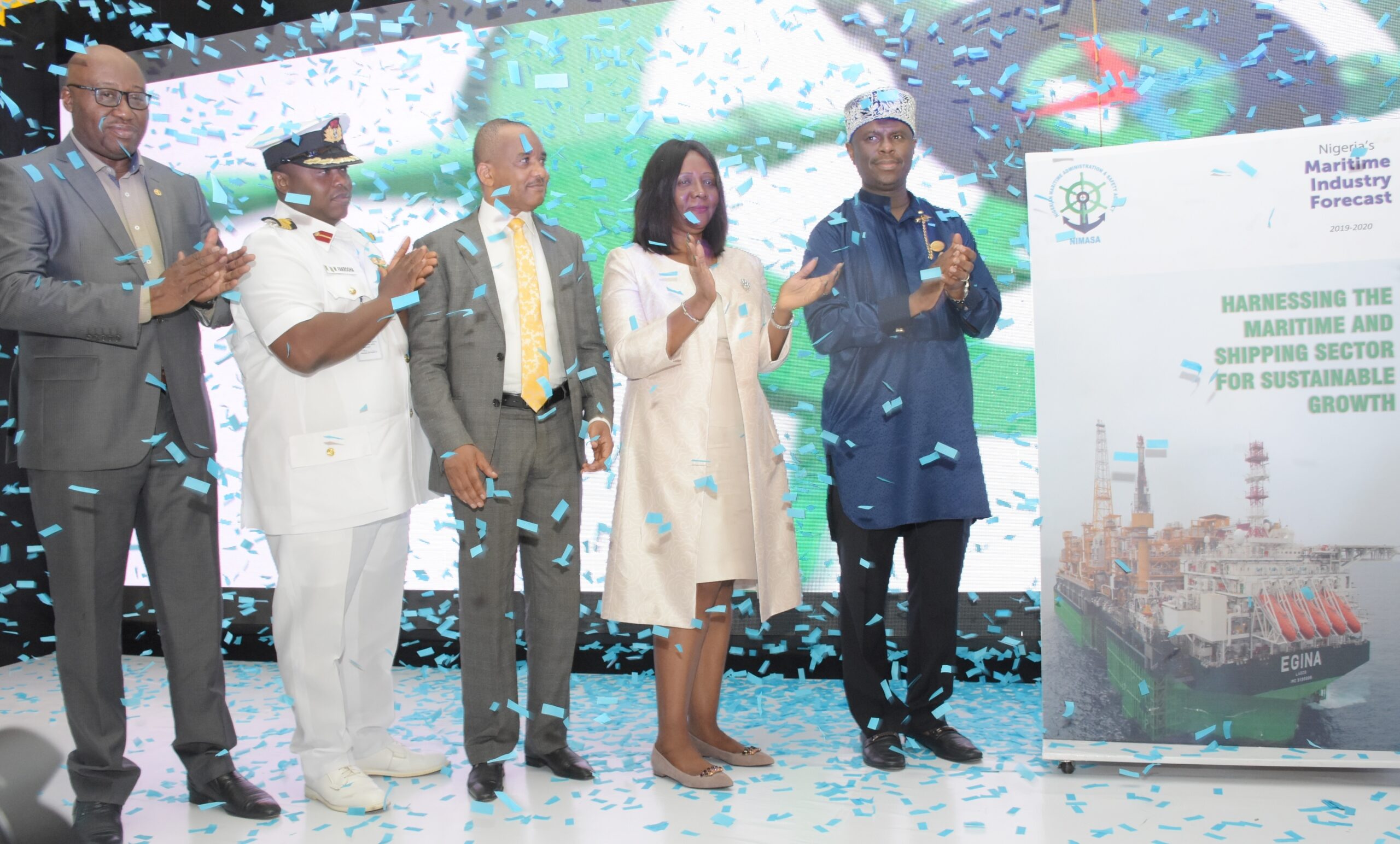NPA Repositions, Targets N500billion Yield, W’Bank’s Logistics Performance Index Ranking

· Operators score Bello-Koko high on half year report
· Remits N55.7billion to CRF
As the Nigerian Ports Authority(NPA) projects the generation of over N500billion by the end of the fiscal year 2023, the need to upscale the infrastructure profile of Nigerian ports in the second half of the years has been re-emphasized even as maritime and logistics experts have called on the management to enhance the nation’s position on the global logistics performance index of the World Bank.
In spite of all the leadership challenges precipitated by operational hiccups, maritime industry stakeholders have applauded the performance of the Mohammed Bello-Koko- led management of NPA in the last one and half year, but noted that they should strive to enthrone synergy among the government agencies and ensure the harmonization of port charges and tariffs for increased port patronage.
Meanwhile, NPA has generated a total revenue of N191, 430,093,501.00 from its operations in the first half of 2023.
The Authority, in the same period, remitted N55,712, 565, 027.46 to the Consolidated Revenue Fund (CRF) of the Federation.
These disclosures were contained in a half-year 2023 performance reports released by the NPA Managing Director and Chief Executive Officer, Mohammed Bello- Koko.
Elucidating on the report, Bello- Koko said that given the prevailing economic headwinds both at the micro and macro levels, these operational statistics for the first six months were reassuring, adding that they catalyzed the commendable remittances to the CRF of the Federal Government thus far.
According to him: “viewed within the context of current global economic upheavals which have affected trade volumes in all climes, our current growth trajectory is encouraging and gives us confidence to project a revenue growth of over 500 billion with concomitant increase in remittance to CRF by end-of-year 2023, given that shipping activities peak around the second half of the year’
“The smart policy thrust of the new administration which is already throwing up new vistas of growth further lends credence to the feasibility of our projections and gives fillip to our organizational initiatives.
Koko added that “the operationalization of Lekki Deep Seaport, expected restoration of the service boat management contract, digitalisation and intensified tightening of collections mechanisms buoys our confidence at meeting and indeed exceeding the revenue projections”.
The Authority has completed operations on a total number of one thousand eight hundred and fifty-one (1851) vessels for the 1st half of 2023 with a combined Gross Registered Tonnage (GRT) of fifty-seven million, eight hundred and seventy thousand and eighty-three (57,870,083).
Cargo throughput for the period under review stood at 33,895,784 metric tonnes, whilst container traffic was 707,985 TEUs (Twenty-foot Equivalent Units).A key indicator of port efficiency which is the average turn-around-time (TAT) of vessels, stood at 5.16days. “This is an improvement and we have put measures in place to surpass it in the second half of 2023,” says Mohammed Bello Koko
Speaking further, Bello- Koko said “we are poised to transform our projections to actualities. The remaining half of the year 2023 will be focused on finalising financing arrangements for our port rehabilitation drive, conclusion of all digitalisations geared towards improvement of efficiency and collaboration with landlocked neighbouring countries like Niger and Chad with whom we have already opened discussions to patronize our ports as hubs for transshipment cargo”
.The NPA boss remarked that “as a management team, we remain unwavering in our resolve to continuously improving on service excellence, blocking avenues of income leakages, curbing waste and tightening collection mechanisms in a bid to surpass stakeholders’ expectations and support the national economy”.
In separate interviews on the assessment of the leadership in the last one and half year and areas to prioritize in the second half of 2023, stakeholders were unanimous in the verdict that they have done well by the circumstance and time available to them.
According to the Director General of the African Centre for Supply Chain, Dr. Obiora Madu, Bello-Koko has to ensure the competitiveness of Nigerian Ports to improve Nigeria’s ranking on the Logistic Performance Index of the World Bank which he describes as very low.
“In his one and half year in office to be very honest, I haven’t seen too many changes, but neither do I blame him because it took quite a while before he settled down. The entire Nigerian Ports Authority needs to be reactivated and reorganized. It needs to run like a quasi-government opposition because it deals basically with private sector.
“He should understand logistics and supply chain management to the letter, the timeliness, and the rest of them. Well, we’ll give them kudos for the Lily Pond Export Terminal, and the rest of them that they have licensed.
“But we need to see those licensed terminals come on board. Those are the places I think he needs to put a lot of his effort because we are not competitive. I told him that the point is that the whole idea of setting up an export terminal is to make life easier for the exporter.
“But if it ends up building up cost to worsen the case of the exporter, then it’s not what it was. So NPA needs to put his feet down and make sure that the objective of creating competitiveness for the economy is achieved.
“So, he has done well, but the fact is that again, on the infrastructure, there’s nothing like a Port without an adequate infrastructure. So, I think that he needs to pay special attention to that. I don’t know whose responsibility it is, whether it is their own or is it that of the federal government.
“Now if you look at Nigeria’s position in the Logistics Performance Index of the World Bank, you will find out that the six pillars that are used to arrive at that, it’s all happening around the port. They are considering assessment, ease of accessing the port. They are considering the quality of logistics service. They are considering infrastructure at the port.
“So, there is the ease of bringing goods in and going out of the ports. So, if you look at it, you see that they are all centered around the port.
“So practically, almost everything about this Logistics Index has to do with the port. So, if we must improve our Logistics Performance Indexes as a nation which is bad where we are now, it is to do something about the port infrastructure and then help Nigeria become more competitive.
“But as I said, kudos to him. There haven’t been too many issues while he’s been in office and consolidating. So, these areas, if you concentrate on these, the life of Nigerians will be better. Our competitiveness will improve,” Dr Madu stated.
In her contribution, the President of Women In Maritime Africa (WIMA) Nigeria and the Managing Director of Ocean Deep Maritime Services Limited, Mrs. Rollens Macfoy said the maritime agencies need synergy and harmonization of operations, adding that the success of one agency is that of others.
In her dispassionate assessment of NPA, she said, “If I want to talk about NPA as an entity, I will miss a lot of things, because NPA is not standing alone. It works in collaboration with others agencies. My advice will be that these agencies and this collaboration should be more strengthened to achieve results, because if they are not strengthened and if they continue to work in silos, it will retard progress. Well, NPA is just an entity and a tree cannot make a forest. That’s my sincere advice.
“I’m noticing a scramble and partition for jobs. Their duplication of functions is affecting the business people, for instance, ship owners, barge owners, licensed agents are complaining. Let’s take, for instance, barge owners, their payments are duplicated. They are answerable to NIMASA, they are answerable to NPA, they are answerable to NIWA. And it’s happening to several other groups in other agencies which are not on a one-stop-shop operation.
“Of course, the consumer, the last person bears the brunt because the agencies increase their prices. And when they increase their prices, it goes down to the people who work with the agencies. And of course, its trickles down to the last person who is the consumer.
She painted a hellish and melancholic picture of a cargo delivery process.”If you have to clear a vehicle now, NPA is there, Customs is there. In fact, even Immigration is there. You clear a vehicle, they give you all the papers, you come out of the port, right there at Tin Can gate, another group is arresting you, saying you don’t have this, you don’t have that. You didn’t declare all, you paid half payment. Who did you make half payment to?
“By the time you get to Liverpool or you get to Ijora Bridge, another group stops you. Before you get to Mile 2 other groups are there. As you move towards, I think, Cele Bus Stop others are there. Also, before you get to Oshodi, another group is there. On the other axis, by the time you are getting to Alaba, you have like ten or four groups, different groups, they will tell you who they represent.
“I don’t understand all these things. So, it’s very difficult for me to talk about these agencies in isolation. They need harmonization and synergy as far as I’m concerned. And we can’t be talking about the blue economy without this. Blue economy cannot be successful if the end users are not getting things at very considerable prices”. She noted.








